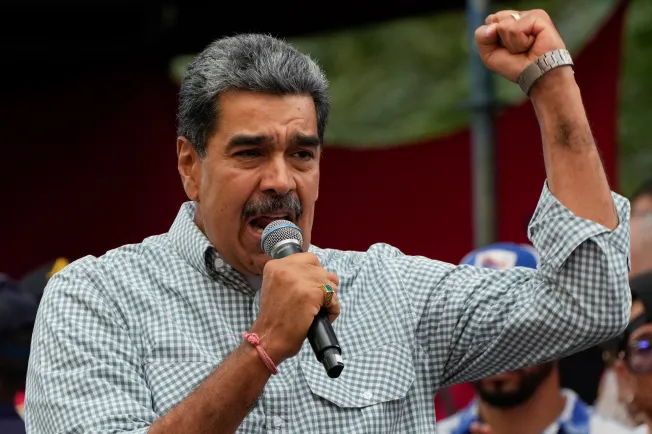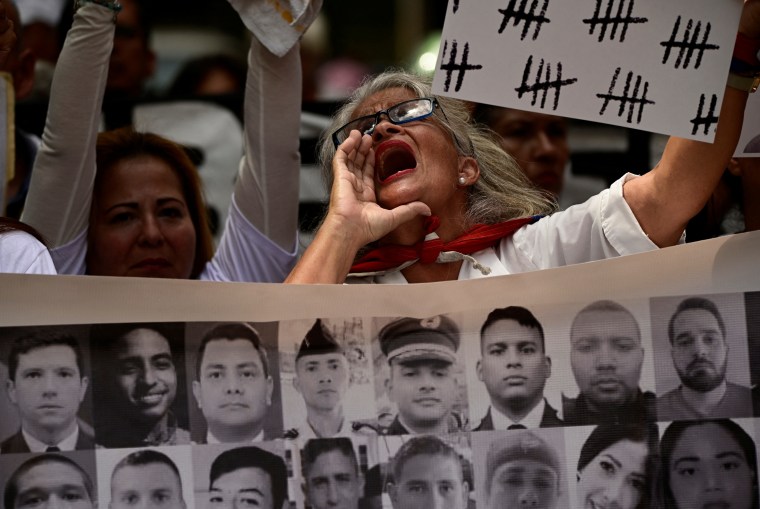Shortly after Venezuela’s disputed presidential election in July, security agents arrested journalist Ana Carolina Guaita and then contacted her family to make a deal.
They offered to release Guaita if her mother, Xiomara Barreto, who worked on the opposition campaign to defeat President Nicolás Maduro, turned herself in. Barreto, who is in hiding, rejected the proposal.
“My daughter is being held hostage,” Barreto said in an August 25 voice recording posted on social media five days after her daughter’s arrest. Then, addressing authorities holding Guaita, she said: “You are doing great damage to an innocent person just because you were unable to arrest me.”

Such extortion schemes are part of what press watchdog groups describe as an unprecedented government crackdown on the Venezuelan media following the election that Maduro claims to have won despite strong evidence that he lost to opposition candidate Edmundo González.
Besides Guaita, his regime has jailed at least five other journalists – Paúl León, Yousner Alvarado, Deysi Peña, Eleángel Navas, and Gilberto Reina. (Another, Carmela Longo, has been released but faces criminal charges and has been barred from leaving the country.)
These journalists are among more than 2,000 anti-government protesters and opposition activists who have been detained following the July 28 balloting, a wave or repression that prompted González, who may have beaten Maduro by a 2-to-1 margin according to opposition tallies, to flee to Spain where he has been granted political asylum.

‘This government has gone crazy’
Venezuela has now reached a decades-long high of journalists it has imprisoned, according to Marianela Balbi, director of the Caracas-based Instituto Prensa y Sociedad, and CPJ’s own data from prior years.
Like Guaita, several were arrested while covering anti-government protests. They face charges of terrorism, instigating violence, and hate crimes. If convicted, Balbi said, they could face up to 30 years in prison each, yet they have no access to private lawyers and have instead been assigned public defenders loyal to the Maduro regime.
Carlos Correa, director of the Caracas free press group Espacio Público, said security agents don’t even bother to secure arrest warrants and have, in some cases, demanded bribes of up to US$4,000 not to detain journalists. In addition, at least 14 journalists have had their passports canceled with no explanation, according to Balbi.
“This government has gone crazy,” Correa told CPJ. “The most hardline elements are now in control and they are angry about being rejected at the polls.”
Among the hardliners is Diosdado Cabello, the number two figure in the ruling United Socialist Party who last month was appointed interior minister. Cabello, who is now in charge of police forces, is a frequent press basher whose defamation lawsuit against the Caracas daily El Nacional prompted the Maduro regime to seize the newspaper’s building as damages in 2021.
Cabello also uses his weekly program on state TV to insult and stigmatize journalists. On the September 5 episode, for example, Cabello accused the online news outlets Efecto Cocuyo, El Pitazo, Armando.Info, Tal Cual, and El Estimulo, of trying to destabilize Venezuela and, without evidence, claimed they were financed by drug traffickers.
All this has created “a lot of fear and frustration,” Balbi said. “This is what happens in countries with no rule of law.”
Journalists flee amid sharp drop in press freedom
To be sure, Venezuela’s press freedom erosion predated the election, as the Maduro government has closed TV and radio stations, blocked news websites, confiscated newspapers, and fomented fear and self-censorship over its 11 years in power. But since the vote, the situation has deteriorated precipitously with the government imposing internet shutdowns and blocking communication platforms, while individual journalists face impossible choices to continue their work.

Several reporters have fled the country. One journalist, who had been covering anti-government protests in the western state of Trujillo, was tipped off last month by a government security agent that her name was on an arrest list. She hid with friends and then, after learning that police were staking out her home, made her way to neighboring Colombia.
“There is so much dread,” said the journalist who, like several sources for this story, spoke to CPJ on condition of anonymity. Government officials “don’t care that you are innocent. Never before have I felt so fragile and vulnerable.”
Those who remain in Venezuela are exercising extreme caution. They are self-censoring, staying off-camera in video reports, leaving their bylines off digital stories, and avoiding opposition rallies. Some radio news programs have gone off the air or have switched to musical formats.
A journalist in western Falcón state told CPJ that security agents are tracking the articles and social media posts of individual journalists and said they have filmed her while covering opposition rallies.
“They make you feel like a criminal or a fugitive from justice,” said the reporter who is considering leaving journalism and fleeing Venezuela.
A veteran reporter in Carabobo state, just west of Caracas, told CPJ that she has worked for years to make a name for herself as a fair and balanced journalist but is now being told by her editors to remove her byline from her stories for her own protection.
Meanwhile, it’s become more difficult for reporters to interview trusted sources and average Venezuelans because, even when they are promised anonymity, they fear government reprisals, a journalist based in western Zulia state told CPJ.
CPJ called Maduro’s press office and the Interior Ministry for comment but there was no answer.
Outlets band together and use AI to shield individual reporters
To protect themselves, many journalists are staying off social media and are erasing photos, text messages, and contacts from their mobile phones in case they are arrested and the devices are confiscated. Some have gone to opposition marches posing as members of the crowd rather than taking out their notebooks and recording gear and identifying as journalists. On such outings, some are required to check in with their editors every 20 minutes to make sure they are safe.
“We are trying to report the news while also protecting our people,” said César Batiz, the editor of El Pitazo, who fled the country several years ago and works from exile in Florida. “We realize that no story is more important that our journalists’ safety.”
Since the election, El Pitazo is jointly publishing stories with several other media outlets in an effort to make it harder for the regime to target any individual news organization. For added protection, many of these same news sites are taking part in Operación Retuit, or Operation Retweet, in which their journalists put together stories that are narrated on video by newsreaders created by artificial intelligence.
“So, for security reasons, we will use AI to provide information from a dozen independent Venezuelan news organizations,” says one of the avatars, who appears as a smiling young man in a plaid shirt in the initial Operación Retuit video posted on X on August 13.
Thanks to all of these efforts important stories are still being published, including reports on regime killings of protesters, the imprisonment of minors arrested at anti-government demonstrations, and electoral observers describing government fraud during the July 28 balloting.
Or, in the words of Batiz: “The regime is cracking down so we have to be more creative.”
Still, Correa, of Espacio Público, says the repression is taking its toll. “Without a doubt there are fewer journalists covering important stories in Venezuela, and much more caution and fear.”
